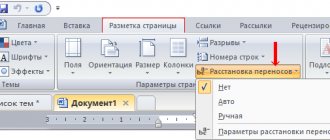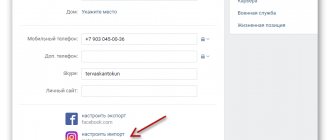Basic units of information measurement. What is MB?
Table 1. Units of information measurement
| 1 byte | 8 bit | 23 bit |
| 1 KB (kilobyte) | 1024 bytes | 210 bytes = 213 bits |
| 1 MB (megabyte) | 1024 KB | 210 KB= 220 bytes= 223 bits |
| 1 GB (gigabyte) | 1024 MB | 210 MB= 220 KB= 230 bytes= 233 bits |
A bit is the basic unit of measurement for the amount of information in a PC. It can have the value one or zero. The next unit is a byte (eight consecutive bits). Bytes measure text, video, graphics. A kilobyte is equal to 1024 bytes, and 1 kilobyte contains 8192 bits. What is MB? This is a unit of information that equals the value of 1024 kilobytes.
Controversial issues regarding the term “megabyte”
Some scientists believe that the term “megabyte” is not entirely correct. After all, judging by its name, one megabyte should equal one million bytes. In this case, this unit should be called “mebibyte”. But in C, "mega" is 10 to the sixth power, and a megabyte is considered equal to 1,048,576 bytes.
A mebibyte is equal to two to the twentieth power. It was recognized and standardized only in 1998. Despite the obvious mathematical calculations, the value of 1048576 bytes is still called a megabyte. Although, in essence, this is the value of a mebibyte. Now it is too late to change the system of data measurement units, because millions of users who are not privy to the intricacies of its formation are accustomed to it. But it is undoubtedly necessary to study this aspect.
Why are many users confused about what MB is and what capacity of information is available to it? Most likely, the first mistakes were made in the 20th century, when the capacity markings on floppy disks reported 1.44 MB (and in the C system this value was 1,440,000 bytes). But in fact, the volume of data on these storage media was equal to 1474560 bytes or 1474 kilobytes. The prefixes of different quantities were combined, resulting in quantities that simply cannot be calculated correctly. In practice, the declared volume of floppy disks did not correspond to reality, which became the impetus for the following errors in measuring information. Now you know what MB is. A short excursion into the history of units of information will help you better understand the intricacies of operating systems.
Who are MBA Finance? Should we be afraid of their threats?
Either pay and enter the schedule with fines and penalties, or then don’t pay at all and you must proceed from the following:
credit holidays are only available for loans secured by real estate;
if your accounts are frozen, they start calling you, writing SMS, sending you letters, demanding payment of the debt, or personally showing up at home or at work, then this means that either the bank, MFO or those to whom they transferred your debt or “hired” to collect the debt, They have identified a delay and are trying to collect it.
Often such communication is accompanied by threats of going to court, forced collection, departure of collection groups, arrest, arrival of bailiffs, initiation of a criminal case under Art. 177, 159 of the Criminal Code of the Russian Federation, initiation of an administrative case, description of all property, bad credit history, ban on traveling abroad, fines and penalties, etc., but all this is just a way to intimidate a person.
The influence of collectors reaches their goal only on legally illiterate, often stupid people who do not know their rights and are led by their methods.
Collectors and bank security services are convinced that the effectiveness of their activities is measured by arrogance and try to solve everything outside the legal framework, since they have no real leverage over the debtor, and they cannot and do not have the right to do anything.
Collectors have the right to come to you, but they do not have the right to enter your apartment, stop you on the street, threaten you, or constantly call you. All this is illegal.
To all their threats, reply that you will call the police, write a statement about extortion, blackmail, threats to life and health, and privacy. They will threaten to bring you to criminal liability, tell them to file a complaint.
If they have evidence that they have ceded the right to claim a debt from the bank, they can only sue you, but this is not beneficial for them, since at the court hearing everything will fall into place and you will have the right to file a counterclaim to invalidate the clauses of the agreement about bonded commission, interest, etc. or, having filed an objection, ask to apply Article 333 of the Civil Code of the Russian Federation on reducing the penalty, interest.
The best way out is to demand that they go to court and wait for the trial, since there is no point in paying such a debt; when paid, all the money will be spent on fines! Why You Need It?
The same goes for debt restructuring. You will be given a new loan that will completely repay the previous one and you will pay on the new loan. But!
You will close the old loan, and it will be calculated for you with all the penalties, fines, and penalties! This is completely unprofitable for you, because in court there is a statute of limitations, a reduction in penalties, etc.
Often, 3 years of limitation could have expired, which begin to run with each payment separately (if monthly payments), and therefore always declare that the statute of limitations has passed.
The bank is obliged to notify that it has assigned the right to claim the debt to collectors; if it has not done this, it bears the risk that you will pay not to the collectors, but to the bank itself, which is no longer the proper recipient of the funds.
Payment of any amount, even 1 ruble towards the debt, interrupts the statute of limitations, and the court will be able to collect the amount of the debt. Therefore, there is no need to make any payments if you have already made a large delay.
The 3-year limitation period is calculated from the moment you last paid something: the limitation period is interrupted by the debtor taking actions indicating recognition of the debt, and after the break, the limitation period begins anew.
The running of the limitation period may be interrupted by the obligated person performing actions indicating recognition of the debt only if at the time of such recognition this period has not expired.
You need to find out on behalf of which organization they are calling, under what agreement, on what basis it is, and not the bank, where their office is located, tax identification number;
Who authorized him to call, full name, position, how can you verify the validity of this information over the phone, say that he does not have the right to call, since he cannot prove that he belongs to the bank or represent its interests, or show the assignment of the right of claim from the bank, let will send it by mail or email (create an email specifically for this).
Ignore and do not answer any of their questions regarding your data and the data of your relatives, address, place of work and any information about yourself at all. Requests, demands for clarification of data, verification, reconciliation, etc. etc. tell me, let them go to court, there will be a court decision, then I will report everything.
If they are rude and rude to you, respond in kind, but do not cross the line of insults, the expression is acceptable: shut up, shut up, get out, extortionists...
Why do you have to answer this way? Since there is an invasion of your personal life, a violation of Article 150 of the Civil Code of the Russian Federation “Life and health, personal dignity, personal integrity, honor and good name, business reputation, privacy, inviolability of home, personal and family secrets, freedom of movement, freedom choice of place of stay and residence, the citizen’s name, authorship, and other intangible benefits belonging to the citizen from birth or by force of law, are inalienable and cannot be transferred in any other way.”
You can completely ignore callers and forward incoming calls to the numbers of the same collectors.
You can require the collector to provide originals (notarized copies) of documents confirming the fact that your debt was transferred to them.
But until you have received by mail (otherwise) the originals (notarized copies) of documents confirming the fact that your debt has been transferred to collectors, there is no need to talk about anything at all, since there is no evidence of the transfer of your debt.
At the same time, all kinds of letters about the transfer of debt, although they are the basis for payments to the new creditor, but in your case they will not send an original agreement or a notarized copy - there is nothing to talk about, since according to paragraph 1 of Art. 385 of the Civil Code of the Russian Federation “Evidence of the rights of a new creditor”
1. The debtor has the right not to fulfill an obligation to a new creditor until he is provided with evidence of the transfer of the claim to this person.
But even with those who have acquired your debt, after establishing all their data, you don’t have to communicate, much less give your contacts and information about yourself, since this is your right; they have no right to insist on communication.
Always send all collectors to one address - to the court.
The mechanism for this is simple: the collector called you, you told him the following:
“For any questions, please contact the court,” they hung up. Everything is extremely simple. Blacklist your phone number on your mobile phone.
Talking about something with a collector is a waste of time and nerves; in fact, it is an empty and unnecessary exercise. And then, I repeat once again - you don’t know who is calling you, which means you can’t talk to strangers about any business issues or loans!
When you call, you have the right to record the conversation on a voice recorder, if it happened, and send a complaint to the police regarding extortion, Article 163 of the Criminal Code of the Russian Federation.
It’s better to do this right away: put it on record and speak, so I put a recording of our conversation, now I’m listening to you.
If someone stops you on the street, do not introduce yourself, do not provide your full name or other information.
If debt collectors come to your home and you can’t open the door, you can call the police about bandits breaking down the door, shouting and threatening.
Do not sign any documents or take anything from debt collectors.
Collectors have no authority to demand anything. You did not enter into any agreements with them, they are not the police or bailiffs (see their rights below).
Sometimes collectors use a uniform similar to that of bailiffs or other government officials, don’t be fooled by this... because it’s all a circus, a clown show designed for gullible citizens.
They also resort to such tricks: in the title indicate some involvement in law enforcement, supervisory authorities, mentioning in the title: Russia, bailiffs
You can contact the police about bringing to administrative responsibility under the Code of Administrative Offenses of the Russian Federation:
Article 13.11. Violation of the legislation of the Russian Federation in the field of personal data.
“Article 14.56. Illegal professional activity in providing consumer loans
Carrying out professional activities for the provision of consumer loans (except for banking activities) by legal entities and individual entrepreneurs who do not have the right to carry them out -
shall entail the imposition of an administrative fine on officials in the amount of twenty thousand to fifty thousand rubles; for legal entities - from two hundred thousand to five hundred thousand rubles.
Article 14.57. Violation of the legislation of the Russian Federation on consumer credit (loan) when taking actions aimed at repaying debt under a consumer credit (loan) agreement
1. Commitment by a creditor or a person acting on his behalf and (or) in his interests (with the exception of credit organizations) of actions aimed at returning overdue debts and violating the legislation of the Russian Federation on the protection of the rights and legitimate interests of individuals when carrying out recovery activities overdue debt, except for the cases provided for in paragraph 2 of this article,
2. The violation provided for by part 1 of this article, committed by a legal entity included in the state register of legal entities engaged in the collection of overdue debts as the main type of activity -
3. Violation of requirements by a person who is a founder (participant), member of the board of directors (supervisory board), member of a collegial executive body, sole executive body of a legal entity included in the state register of legal entities engaged in the collection of overdue debts as the main activity and restrictions established in relation to these persons by the legislation of the Russian Federation on the protection of the rights and legitimate interests of individuals when carrying out activities to repay overdue debts -
4. Illegal implementation by a person not included in the state register of legal entities carrying out activities for the return of overdue debts as the main type of activity, actions that, in accordance with the Federal Law “On the protection of the rights and legitimate interests of individuals when carrying out activities for the return of overdue debts” and on amendments to the Federal Law “On Microfinance Activities and Microfinance Organizations” can only be carried out by a legal entity included in the specified register, -
Write a statement about extortion under Article 163 of the Criminal Code of the Russian Federation and about a threat to life and health (if any) to the nearest police station. Please attach to your application all letters received from debt collectors, audio recordings of conversations, and other evidence. You indicate from which phones who called, when, what they demanded, how they threatened.
Everything that collectors have the right to do to return the debt and collect the debt (see Articles 4 – 11 of the law):
Federal Law of July 3, 2016 N 230-FZ “On the protection of the rights and legitimate interests of individuals when carrying out activities to repay overdue debts and on amendments to the Federal Law “On microfinance activities and microfinance organizations”
Article 4. Methods of interaction with the debtor
1. When taking actions aimed at returning an overdue debt, the creditor or a person acting on his behalf and (or) in his interests has the right to interact with the debtor using:
1) personal meetings, telephone conversations (direct interaction);
2) telegraph messages, text, voice and other messages transmitted over telecommunication networks, including mobile radiotelephone communications;
3) postal items at the place of residence or place of stay of the debtor.
2. Other, except for those specified in part 1 of this article, methods of interaction with the debtor of a creditor or a person acting on his behalf and (or) in his interests may be provided for by a written agreement between the debtor and the creditor or a person acting on his behalf and (or) in his interests.
5. The interaction of the creditor or a person acting on his behalf and (or) in his interests with any third parties, which for the purposes of this article means members of the debtor’s family, relatives, other persons living with the debtor, neighbors and any other individuals, at the initiative of the creditor or a person acting on his behalf and (or) in his interests, can only be carried out if the following conditions are simultaneously met:
1) there is the consent of the debtor to carry out interaction with a third party aimed at returning his overdue debt;
2) the third party has not expressed disagreement with the interaction with him.
6. The consent specified in paragraph 1 of part 5 of this article must be given in writing in the form of a separate document, including the consent of the debtor to the processing of his personal data.
7. The debtor has the right to withdraw consent at any time, etc…………….
6. In telegraph messages, text, voice and other messages transmitted over telecommunication networks, including mobile radiotelephone communications, in order to return an overdue debt, the debtor must be informed:
1) last name, first name and patronymic (if any) or the name of the creditor, as well as the person acting on his behalf and (or) in his interests;
2) information about the presence of overdue debt, including its size and structure (from November 12, 2018)
3) contact telephone number of the creditor, as well as the person acting on his behalf and (or) in his interests.
For simple bank loans, according to clause 21 of Art. 5, Federal Law of December 21, 2013 N 353-FZ (as amended on July 3, 2016) “On consumer credit (loan)”
The amount of the penalty (fine, penalty) for failure to fulfill or improper fulfillment by the borrower of obligations to repay a consumer loan (loan) and (or) pay interest on the amount of a consumer loan (loan) cannot exceed twenty percent per annum if, under the terms of the consumer loan agreement ( loan) on the amount of a consumer loan (loan), interest is accrued for the corresponding period of violation of obligations, or if, under the terms of the consumer loan (loan) agreement, interest is not accrued on the amount of a consumer loan (loan) for the corresponding period of violation of obligations, 0.1 percent from the amount of overdue debt for each day of violation of obligations.
For microfinance organizations, interest for use under a short-term loan agreement is accrued only for the duration of the loan agreement specified in the agreement, that is, for example, for 15 days and cannot continue to accrue after the expiration of the loan agreement, since otherwise actually indicates the perpetual nature of the obligations the borrower arising from such an agreement, as well as the absence of any restrictions on the amount of interest for using a microloan.
If at the time of conclusion of the agreement interest restrictions were not in effect, then the amount of interest charged for using the loan was subject to calculation based on the weighted average interest rate calculated by the Bank of Russia on loans provided by credit institutions to individuals in rubles for a period of more than one year, as of the day of conclusion of the agreement microloan
(Determination of the Judicial Collegium for Civil Cases of the Supreme Court of the Russian Federation dated August 22, 2021 N 7-KG 17-4)
According to Part 1 of Article 12.1. Federal Law “On microfinance activities and microfinance organizations” (if a loan was received before January 28, 2019, from that date clause 1 has become invalid)
1. After a delay in fulfilling the obligation of a borrower - an individual to repay the loan amount and (or) pay interest due, a microfinance organization under a consumer loan agreement, the repayment period of the consumer loan for which does not exceed one year, has the right to continue to accrue interest to the borrower - an individual only on the part of the principal debt that has not been repaid by him. Interest on the portion of the principal amount not repaid by the borrower continues to accrue until the total amount of interest payable reaches an amount equal to twice the amount of the outstanding portion of the loan. A microfinance organization does not have the right to accrue interest for the period of time from the moment the total amount of interest payable reaches an amount equal to twice the amount of the outstanding part of the loan until the borrower partially repays the loan amount and (or) pays the due interest.
According to paragraph 2 of this article, “After a delay in fulfilling the obligation of a borrower—an individual—to repay the loan amount and (or) pay the interest due, a microfinance organization under a consumer loan agreement, the repayment period of the consumer loan for which does not exceed one year, has the right to charge the borrower—an individual the person is subject to penalties (fines, penalties) and other measures of liability only for the portion of the principal debt not repaid by the borrower.”
Also, by order of the Federal Bailiff Service of Russia dated December 28, 2016 N 822, it was approved “On approval of the debtor’s application form for interaction with the creditor and (or) a person acting on his behalf and (or) in his interests, only through a representative or for refusal to interact”
The form of the debtor’s application to interact with the creditor only through a representative or to refuse such interaction has been approved
In accordance with the Federal Law of July 3, 2016 N 230-FZ “On the protection of the rights and legitimate interests of individuals when carrying out activities to repay overdue debts and on amendments to the Federal Law “On microfinance activities and microfinance organizations”, the debtor has the right to send to the creditor and ( or) to a person acting on his behalf and (or) in his interests, a statement regarding interaction with the debtor in the ways provided for by Federal Law, indicating the interaction only through a representative specified by the debtor or refusal of such interaction.
Roskomnadzor also reminds that creditors have the right to make telephone calls about the return of overdue debts only with the consent of the debtor himself or his authorized persons. The absence of the will of the debtor or persons acting in his interests makes such telephone calls illegal.
Citizens who have suffered as a result of unlawful actions have the right to contact Roskomnadzor, attaching supporting materials. The appeal can be submitted electronically
These are federal services, but the websites contain information about your territorial authorities, where it is better to send complaints.
CONTROL over collectors is carried out by the BAILTIF SERVICE OF RUSSIA and at the control points,
May be useful for appeals: (send all written complaints by registered mail with a written acknowledgment of receipt. Duplicate your written appeals, appeals via the Internet, including to territorial authorities).
Central Bank of the Russian Federation (Bank of Russia) 107016, Moscow, st. Neglinnaya, 12, Bank of Russia;
General Prosecutor's Office of the Russian Federation, 125993, GSP-3, Russia, Moscow, st. B. Dmitrovka, 15 a, t., Internet reception
Federal Service for Supervision of Consumer Rights Protection and Human Welfare, 127994, Moscow, Vadkovsky Lane, 18, building 5 and 7 Internet
FEDERAL SERVICE FOR SUPERVISION IN THE FIELD OF COMMUNICATIONS, INFORMATION TECHNOLOGIES AND MASS COMMUNICATIONS (ROSKOMNADZOR), 109074, Moscow, Kitaygorodsky proezd, 7, building 2 Internet reception
Since you are also sending a complaint to Rospotrebnadzor, Roskomnadzor, you should also indicate that your personal data was transferred to third parties without your knowledge and consent, which violates your rights under the Law (Federal Law of July 27, 2006 N 152-FZ “ About personal data"), as well as all of the above violates your rights as a consumer, ask to protect your rights as a consumer of banking services, if there was an assignment of the right of claim, then write that you, on the basis of Article 388 of the Civil Code of the Russian Federation, do not agree as a debtor , for the assignment of a claim under an obligation in which the identity of the creditor is essential for the debtor (but for a simple loan, this is not the case). And so on.
Duplicate your written appeals with appeals through online receptions (now all federal bodies have them). It is advisable to send all written complaints by registered mail (you can also include a list of attachments, where you can describe the documents enclosed in the letter) and a written notification (you will receive this when the letter reaches the addressee).
(https://rkn.gov.ru/treatments/ask-question/).
reception https://rospotrebnadzor.ru/virtual/feedback
https://genproc.gov.ru/ipriem/
https://www.rsoc.ru/treatments/ask-question








